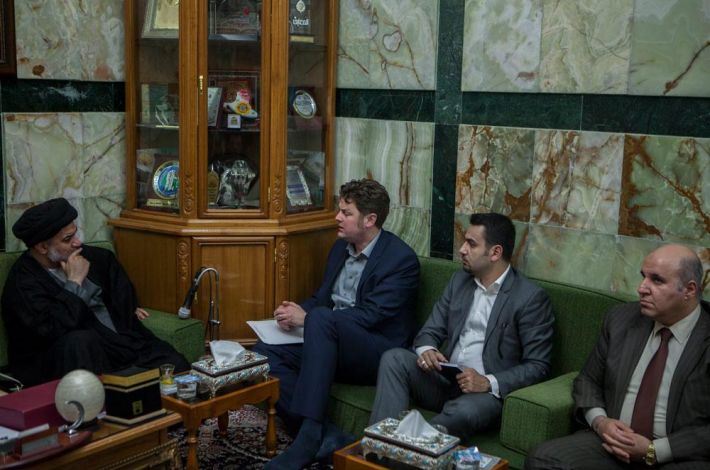A delegation headed by Mr. Ju'il Alberg, Director of peace project at the Academy "Folke Bernadotte" of the Swedish Royal University at Stockholm for the peace projects, has visited the Al-Abbas's (p) holy shrine along with the United Nations representative in Karbala, Mr. Ali Kamoona and representatives of the Chancellery of national reconciliation. They have met with the Secretary-General of the Al-Abbas's (p) holy shrine, Sayed. Ahmad Al-Safi to discuss the Iraqi national reconciliation and put mechanisms that the Swedish Academy has adopted to reunite the Iraqi factions. Mr. Ju'il Alberg has stated: "This visit is part of several visits of political, religious and cultural figures within the Iraqi dialogue that is designed to analyse the important topics in the political process in Iraq, and in order to discuss the economic factor that important to this country as it has become one of the controversial factors between the Iraqi politicians."
Adding: "The mechanism of this project has played a key role in contributing to the success of the dialogue process for the establishment of a democratic citizen state away from the sectarian speeches. The Academy had supported earlier the national dialogue process from 2008 to 2010 within a project named "Sando". Various meetings and conferences have been held in Sweden and Iraq, which encouraged us to pursue such projects that create fertile atmosphere for reconciliation of all sects and ethnicities in Iraq. On the basis of an economic development based on a sober and a strong citizenship, emphasising on the economic factor that is the active agent through which we can dissolve all the differences and create a sound environment for dialogue."
For his part, Sayed. Ahmed Al-Safi stated: "The economic factor and the distribution of wealth occupy the most prominent points of disagreements between the politicians in the country, their treatment is one of the important factors of the national reconciliation, and we have refused this mechanism since the start as we don't want the distribution of wealth, as 65 % of Iraqi oil is concentrated mostly in the south in Basra, which can lead to a future state division and other provinces will remain without resources, which we have stated at that time when the Iraqi constitution was written in 2003."
Adding: "The majority of the Iraqi people parties feel injustice as a result of past practices so they wanted to put a text to compensate what they have missed, but when the trust was lost between the political parties, each of them explained the texts according to their benefits. So the main problem was the loss of trust."
Sayed. Al-Safi called the delegation to: "work of the trust factor as if with your team you could establish again the trust between the different parties, it will solve a lot of problems, then we can start treating the existing problems, that are mainly, the economic and security problems, as since twelve years Iraq suffers from economic problem as it relies only on oil and any international petrol setback will lead to a financial setback, which shows the importance of setting up a greater economic policy in the country to ease the negotiation bases on mutual trust."



